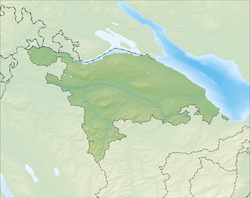Aadorf
| Aadorf | ||
|---|---|---|

Aadorf village main street
|
||
|
||
| Coordinates: 47°30′N 8°54′E / 47.500°N 8.900°ECoordinates: 47°30′N 8°54′E / 47.500°N 8.900°E | ||
| Country | Switzerland | |
| Canton | Thurgau | |
| District | Münchwilen | |
| Area | ||
| • Total | 19.93 km2 (7.70 sq mi) | |
| Elevation | 517 m (1,696 ft) | |
| Population (Dec 2015) | ||
| • Total | 8,794 | |
| • Density | 440/km2 (1,100/sq mi) | |
| Postal code | 8355 | |
| SFOS number | 4551 | |
| Localities | Aadorf, Aawangen, Bürg, Ettenhausen, Friedtal, Guntershausen bei Aadorf, Häuslenen, Huzenwil, Maischhausen, Moos, Tänikon, Weiern, Wittenwil, Wittershausen | |
| Surrounded by | Bichelsee-Balterswil, Frauenfeld, Hofstetten bei Elgg (ZH), Elgg (ZH), Hagenbuch (ZH), Matzingen, Turbenthal (ZH), Wängi | |
| Website |
www SFSO statistics |
|
Aadorf is a municipality in the district of Münchwilen in the canton of Thurgau in Switzerland. In 1996 Ettenhausen, Guntershausen bei Aadorf and Wittenwil merged into Aadorf.
Aadorf is first mentioned in 886 as Ahadorf. The oldest record of Tänikon, now part of Ettenhausen, dates to 789 as Tanninchova. Tänikon is also the site of the Tänikon monastery, founded in the 13th century. Aawangen is first mentioned in 844 as Oninwanc. Ettenhausen is first mentioned in 1278 as Oetenhuse. Guntershausen bei Aadorf is first mentioned in 1282 as Gundolthuser tal. On 6 April 1358 the brothers Herman and Beringer von Landenberg and Hermann von Landenberg donated the church of Aadorf to the Rüti Abbey.
The territory of the municipality was enlarged in 1996, when it absorbed the neighboring municipalities of Aawangen, Ettenhausen, Guntershausen bei Aadorf and Wittenwil. As of 2008, it was the canton's seventh largest municipality.
Graves from the Hallstatt period were discovered near Elgg and west of Bruggwingert. The Bachwiesen archeological site has yielded scattered finds from the Bronze and Roman eras. The Church (current building from 1863–65) was founded in 840 by the Emperor, and in 886 it was mentioned as the principal church of the Counts of Linzgau. The nearby older cemetery at Sonnhalde dates from the 7th and 8th Centuries. In 890, Count Udalrich IV established a clerical community that was affiliated with the church, for the care of his burial place. But by 894/895 this community had already transferred to the Abbey of St. Gall. The right to appoint the priest, was acquired by the Lords of Bernegg before 1304. In 1318, these rights transferred to Hermann of Hohenlandenberg-Greifensee, in 1349-50 they went to Rüti monastery and after the monastery's secularization in 1525 the rights went to Zurich.
...
Wikipedia




